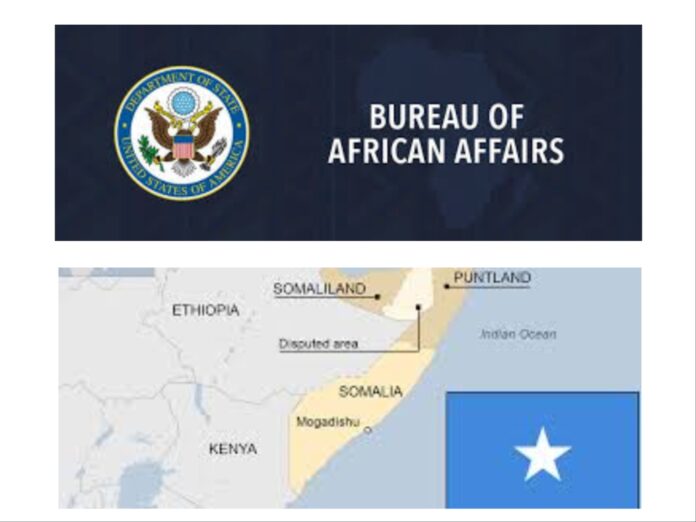MOGADISHU (Kaab TV) – The U.S. State Department has issued a strongly worded statement cautioning against decisions taken without broad-based consensus in Somalia’s political and electoral processes, a move that has been widely welcomed across the country.
The statement, released Friday by the State Department’s Bureau of African Affairs on social media platform X, warned that such unilateral actions would “lack legitimacy and distract from pressing security challenges.”
“All relevant stakeholders should have a say in changes to Somalia’s federal and election systems,” the statement read.
On Wednesday, President Hassan Sheikh’s office released a statement from the National Consultative Council (NCC) without the inclusion of Puntland and Jubaland. The statement announced plans to hold elections and move forward with a new, controversial initiative to establish a so-called “legitimate” Jubaland state—despite the current existence of Jubaland.
Deep political divisions
This diplomatic intervention comes as Somalia grapples with deep political divisions surrounding proposed changes to its federal constitution, championed by President Hassan Sheikh Mohamud.
These controversial reforms have drawn criticism and rejection from several federal member states and key political stakeholders.
With just a year left in President Mohamud’s term, concerns are mounting over the lack of a transparent and inclusive electoral process.
Instead of building consensus, the president has appointed an electoral committee tasked with organizing a “one-person, one-vote” election—an initiative that has not received the endorsement of major political figures, regional leaders, or civil society organizations.
The U.S. warning is seen by many as a pivotal moment.
“The U.S. statement came at a crucial time when Somalia is facing a serious political and security crisis,” said Mohamed Hassan, leader of the newly established Somali Democratic Alliance party.
“Decisions imposed by one side will only deepen division. Right now, security is deteriorating, and extremist groups are gaining ground near Mogadishu, yet the government’s recent actions have alienated the public.”
Rashid Abdi, a prominent Horn of Africa analyst based in Kenya, described the statement as a significant shift in U.S. policy.
“Hassan Sheikh was hailed as a reformer exactly three years ago. Since then, he’s received strong Western backing. But that era is ending. Many now view him as an unreliable partner and even a destabilizing figure. The U.S. statement marks a turning point,” Abdi wrote on social media.
Somalia’s civil society also welcomed the move.
Abdalle Ahmed Mumin, Secretary General of the Somali Journalists Syndicate, said the message echoed longstanding concerns raised by independent civil society groups.
“Thank you @AsstSecStateAF and @StateDept for this strong and clear message. This is what we, as civil society actors, have been saying for a long time. Ignoring inclusive dialogue undermines peace and worsens the terror threat,” Mumin posted on X.
Some Somali parliamentarians also expressed their support, viewing the U.S. intervention as a step toward restoring trust and pushing for a more inclusive political process.


